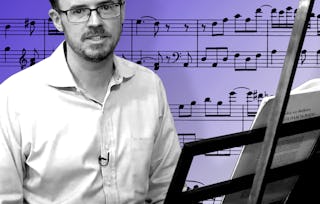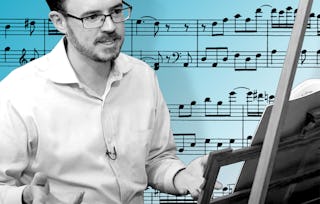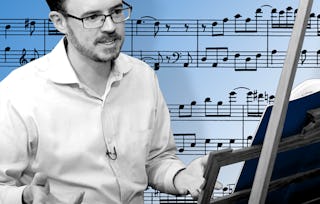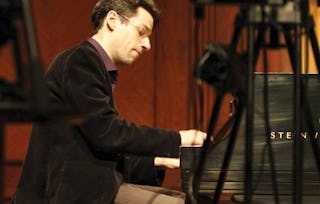In this course, you’ll review sonata form and learn how the piano sonata was revitalized in the 20th century, with a particular attention to composers from Russia, where the sonata was an especially popular and successful genre. You’ll study some of the most influential piano sonatas of the 20th century, in both Neo-Classical and avant-garde styles. This course will also expose you to a variety of lesser-known and more recent compositions, showing how the piano sonata genre continues to expand and to thrive.

Ends soon: Gain next-level skills with Coursera Plus for $199 (regularly $399). Save now.

The Piano Sonata: Russian and 20th-21st Century Composers
This course is part of Exploring Piano Literature: The Piano Sonata Specialization

Instructor: Matthew Bengtson
Included with
(15 reviews)
What you'll learn
Learn how the piano sonata was revitalized in the 20th century.
Study both Neo-Classical and avant-garde styles.
Explore the work of Russian composers, such as Scriabin, Medtner, and Prokofiev.
Skills you'll gain
Details to know

Add to your LinkedIn profile
6 assignments
See how employees at top companies are mastering in-demand skills

Build your subject-matter expertise
- Learn new concepts from industry experts
- Gain a foundational understanding of a subject or tool
- Develop job-relevant skills with hands-on projects
- Earn a shareable career certificate

There are 4 modules in this course
In the first week, you'll be introduced to the course structure and to the fundamentals surrounding sonata form and the history of the genre.
What's included
5 videos3 readings1 assignment1 discussion prompt
This week looks at Russian composers, who were highly invested in the piano sonata genre in the 20th century. We will focus primarily on the works of the three major sonata composers: Scriabin, Medtner, and Prokofiev. We will also get acquainted with a number of other important Russian composers in this genre.
What's included
13 videos9 readings2 assignments3 discussion prompts
This week looks at some of the most extraordinary piano sonatas composed after the Romantic Era (excluding Russians). We consider seven sonatas in some detail, by three French composers, two of German descent, and two born in America. The end of the course points towards the music of today by considering the extraordinary diversity of composers and works that led to it.
What's included
8 videos10 readings2 assignments2 discussion prompts
For more advanced learners, an Honors Formal Analysis is available in this final week (not required for completion of the course).
What's included
4 readings1 assignment1 discussion prompt
Earn a career certificate
Add this credential to your LinkedIn profile, resume, or CV. Share it on social media and in your performance review.
Instructor

Offered by
Explore more from Music and Art
 Status: Free Trial
Status: Free TrialUniversity of Michigan
 Status: Free Trial
Status: Free TrialUniversity of Michigan
 Status: Free Trial
Status: Free TrialUniversity of Michigan
 Status: Free
Status: FreeCurtis Institute of Music
Why people choose Coursera for their career





Open new doors with Coursera Plus
Unlimited access to 10,000+ world-class courses, hands-on projects, and job-ready certificate programs - all included in your subscription
Advance your career with an online degree
Earn a degree from world-class universities - 100% online
Join over 3,400 global companies that choose Coursera for Business
Upskill your employees to excel in the digital economy
Frequently asked questions
To access the course materials, assignments and to earn a Certificate, you will need to purchase the Certificate experience when you enroll in a course. You can try a Free Trial instead, or apply for Financial Aid. The course may offer 'Full Course, No Certificate' instead. This option lets you see all course materials, submit required assessments, and get a final grade. This also means that you will not be able to purchase a Certificate experience.
When you enroll in the course, you get access to all of the courses in the Specialization, and you earn a certificate when you complete the work. Your electronic Certificate will be added to your Accomplishments page - from there, you can print your Certificate or add it to your LinkedIn profile.
Yes. In select learning programs, you can apply for financial aid or a scholarship if you can’t afford the enrollment fee. If fin aid or scholarship is available for your learning program selection, you’ll find a link to apply on the description page.
More questions
Financial aid available,

